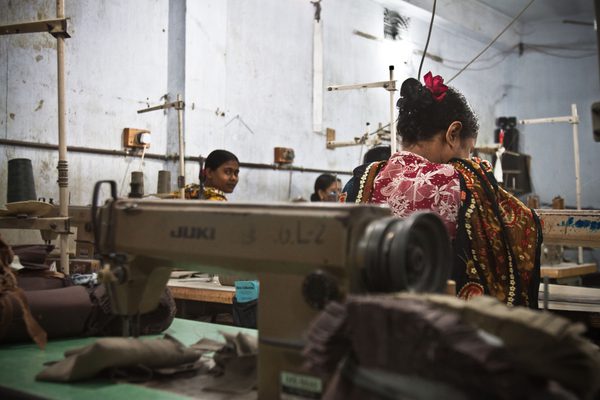A Business and Human Rights Treaty? Why Activists Should be Worried
4 June 2014

This commentary is the second in a series.
The call by a group of states at the UN Human Rights Council to begin diplomatic deliberations towards a UN treaty on business and human rights has drawn the backing of a growing list of civil society organisations.
Led by Ecuador and South Africa, the call is to establish an open-ended inter-governmental working group at the UN to consider “a legally binding framework to regulate the work of transnational corporations and to provide appropriate protection, justice and remedy to the victims of human rights abuses.” The response by civil society has been remarkable. In the few months since the idea of a process towards a “legally binding international instrument” was launched, over 400 civil society organisations have supported the idea, including the idea of an open-ended working group at the UN to begin discussions towards such a treaty.
There is, of course, opposition. Business representatives are opposed, seeing in the move an attempt to revive the long-dead UN Norms on the Responsibilities of TNCs, which were rejected by states almost as soon as they were promulgated 2003. Today, many member States at the HRC feel caught off guard, arguing that now is not the time, and that three years is too short a time to build momentum to implement the UN Guiding Principles on Business and Human Rights endorsed unanimously by the HRC in June 2011. There is also a fear that the initiative will derail the carefully constructed diplomatic consensus on business and human rights that has prevailed at the Council for almost a decade.
Opposition to the idea of a treaty from states and business is to be expected. What is more surprising is the extent to which civil society appears to support the idea, apparently blind to the very real risks of de-railing their own agenda. Don't get me wrong, I think a treaty that harmonizes state regulation of aspects of business accountability is probably needed - for example, on extra-territorial reach for domestic remedies, or on modes of liability for business entities. But I think activists around the world should be worried by a treaty process in Geneva as it is presently formulated: the substance of the process is way too broad and risks boxing all activism on corporate accountability into a protracted treaty process in which accountability will have to compete with other issues and activists will have less clout than in comparable processes.
By way of explanation, let me set out some basic truths – and deal with one or two misconceptions - about the legal and political context in which this proposed treaty process might go forward.
First, the truth is there has been little progress in state protections against human rights violations by business. The litany of human rights abuses linked to business activity continues to grow and state action so far simply has been too little and too weak. The judicial remedies for victims of human rights abuses are no more accessible or effective today than they were in 2011, and arguably less so if you consider the restrictions imposed by the US Supreme Court in the Kiobel ruling of last year. Progress has been made in some areas: there are more effective non-judicial remedies in a select few countries, and there are new laws on conflict minerals and corporate reporting requirements, not least in the US and EU. But no country has passed laws which bind companies with direct liabilities for their involvement in human rights abuses (France has come closest). As a result, there is growing frustration among activists that, despite the unanimous endorsement of the UN Guiding Principles on Business and Human Rights by the HRC, the last three years have seen little in the way of state implementation.
A second truth is that the frustration reflected in the call for a treaty process has shaken things up in Geneva. The complacency of states around the business and human rights agenda has been encouraged by the consensus at the Council surrounding the UN Guiding Principles: few countries are implementing national action plans for the UN Guiding Principles and it has been unclear whether states will ever have to explain to the Council what they have or have not done to protect human right against violations by business. The HRC itself has seemed indifferent to state implementation of the GPs, allowing its Working Group on Business and Human Rights to pursue its work as though remedies and due diligence regulation were just a few of many priorities, instead of the minimum basis upon which to build the framework for protection. Yet, the threat to the diplomatic consensus presented by Ecuador’s initiative seems to have mobilized other members of the Council to look more seriously at measures to move GPs implementation forward. If the heat being generated in Geneva by the call for a treaty is any indication, diplomatic complacency appears to be over, at least for the moment.
But it is false to hope that a treaty process in Geneva will be able to sustain that kind of pressure. The moment an open-ended inter-governmental working group is established at the UN, the pressure will be off state representatives in Geneva to explain what progress they have made at home. All eyes will be on the treaty process, and states will be able to spend their time taking positions for or against specific formulations of treaty language, as opposed to actually working to end at corporate abuses through policy and law and reporting to the Council on how they are doing so. This may be the way to advance international law on the issue in the long run, but it is no way to ensure states act to hold corporate abusers to account any time soon.
Even worse is the prospect that a focus in Geneva on a treaty process will divert limited civil society energy, resources and political will into that treaty process and away from what really matters: holding governments to account (in Geneva and at home) for their failures to protect against human rights violations by business. This is perhaps the greatest risk of all, for without a domestic constituency advocating for the rule of law, enforcement against corporations will simply never happen.
Besides diverting the vital political energy necessary for enforcement into a vague and time-consuming treaty dialogue, an open-ended working group in Geneva will blunt the power of domestic political constituencies that are pushing governments to hold business to account. Gone will be the multiple entry-points for activism at the national level generated by the wide scope of the business and human rights agenda (mandatory due diligence, criminal, civil and administrative remedies, labour law, procurement rules, non-judicial remedies, responses to conflict etc), only to be replaced by a single agenda item - a treaty - one being negotiated in Geneva by states (civil society access to the process is by no means a certainty). And a treaty process is the perfect excuse for governments to fend off demands from activists to regulate and hold business accountable for human rights violations – because to do so in advance of a treaty on business and human rights would put their own national businesses at a disadvantage. Far better, governments will argue, to wait for international consensus, to wait until a treaty is signed, and then ratified and then domesticated in national legislation.
Normally, it would be possible to do both, to push a treaty process in Geneva and a legislative or regulatory agenda at home. In fact, activist leverage in both places would be ideal for moving an agenda forward. Activists in Latin America and Europe have long used international human rights mechanisms to force state action at home. The problem is that the basic institutional conditions for such a strategy to be successful do not exist today: the HRC does not yet have the machinery to monitor state implementation on this issue, which is a necessary mechanism to allow for pressure to be brought to bear on the real issues of corporate accountability. That is a problem which needs solving. But it is false to claim that we need a treaty to do that - a resolution demanding states report to Special Rapporteurs or another body in Geneva would suffice.
The other obstacle to the idea that activism would benefit from international and national processes is simply that the proposed treaty process has, at present, no clear objective. An “international legally binding instrument on human rights, transnational corporations and other business enterprises” is a formulation that enables a large number of people to sign on. But the subject matter is so wide that it makes an international law approach either redundant (because states already have duties to protect all human rights against violations by business) or impossible to organize around (because the interests to be protected or regulated are too diverse and diffuse). Judging from the views I have heard on this issue, there is no consensus among supporters of a treaty about the target, whether it should be all businesses or just TNCs, whether it should directly bind companies or states. Many appear to want to resist the idea of a narrower approach focusing on specific human rights protections, failing to see that any attempt to move the entire bundle of the business and human rights policy agenda forward at once will immediately fall afoul of how international law-making actually works, not to mention inter-state politics. It is hard to think of an international economic or human rights treaty geared towards detailed regulation that has successfully attempted any legally binding instrument of similar scope (think about it: anti-corruption conventions govern one act; ILO conventions, developed over a century of law-making, are designed to protect a specific set of human rights; even the GATT/WTO, as complex as it is, is limited to lowering trade barriers).
Putting this issue to an open-ended inter-governmental working group at the UN is one possible way to clarify the international law issues, but it is not necessarily the wisest first step if the objective is to protect people from human rights abuse connected to business activity, or even for those who wish to see improvements in business behaviour. The combination of unclear objectives in a state-based process, in which civil society must compete with business for influence, is not a promising start. And embarking on an open-ended discussion runs the risk of a result that redefines the existing international consensus in a way that activists might not like, in particular with respect to the way due diligence should be reflected in legal liabilities or in the balance of jurisdiction between home and host states.
Pushing the development of international law to plug gaps in global governance concerning business is a perfectly legitimate aim, and I have the greatest of respect for those whose objective this is (international law is my thing after all). But for activists going up against powerful business lobbies at the national and international levels, I can't help feeling it would be wiser to force the issue of accountability at the level of national law. It is at the national level where regulation will have to happen anyway and where a constituency in favour of regulating corporate abuses will have to be mobilized if enforcement is ever to be made a reality.
A treaty process today will not enable civil society leverage and will probably hinder it. It risks diverting the mobilization against corporate impunity that is occurring around the world today with a vague promise of a development in international law in a decade or two. The present, broad call by states for an "international legally binding instrument" on business and human rights subsumes the corporate accountability agenda in an amorphous business and human rights agenda. Instead, we should recognize that ending impunity is the most fundamental part of the business and human rights agenda. Unless the proposal for a treaty process is narrowed and focused on those aspects of international law that can enable accountability at the national level, I think activists should be wary of a treaty process in Geneva.




